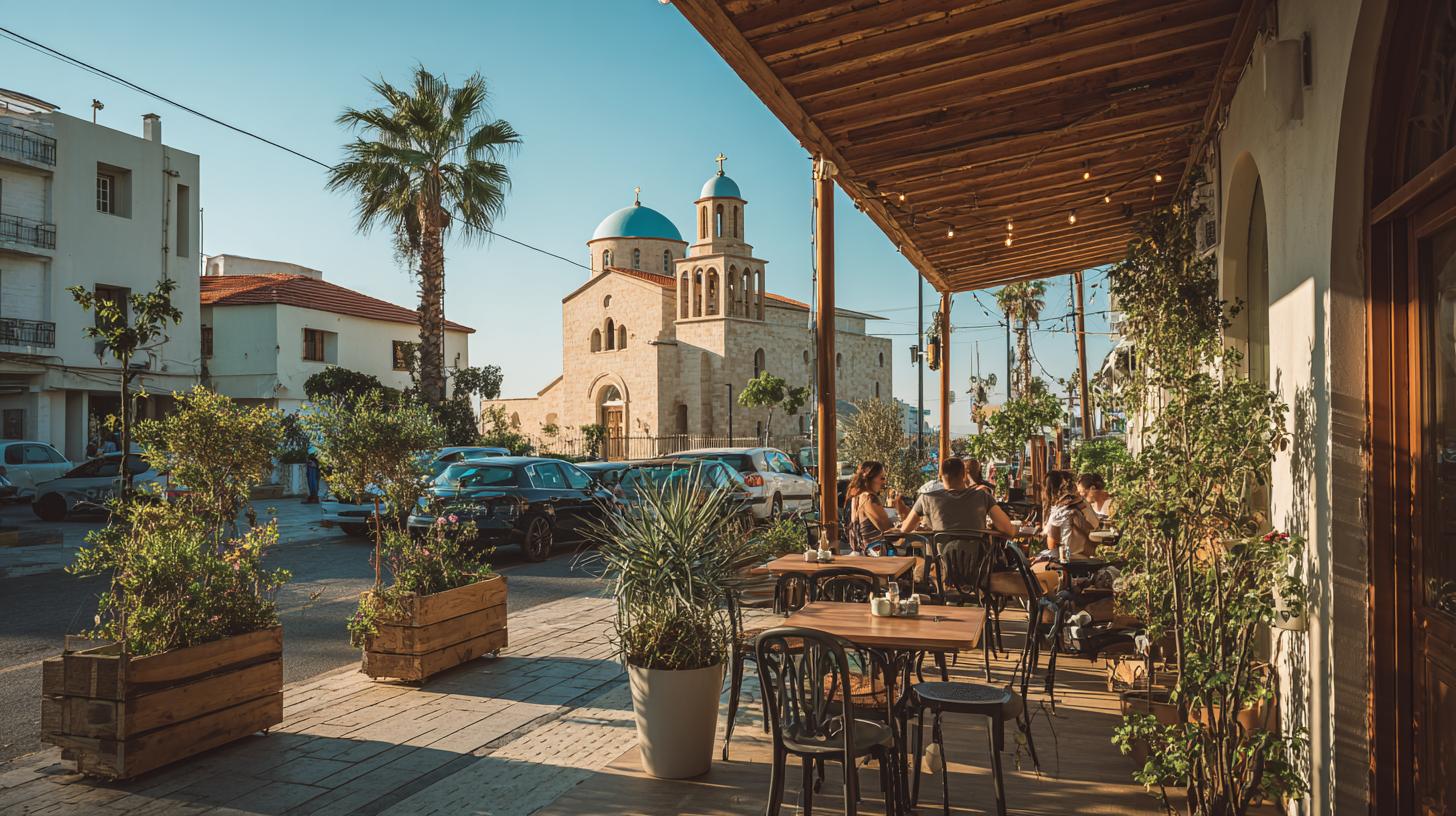Cyprus, long known for its breathtaking Mediterranean landscapes and rich cultural heritage, is now becoming a noteworthy destination for coffee enthusiasts. While the island traditionally gravitates toward the beloved frappé, an iced instant coffee symbolizing casual summers and local gatherings, a dynamic shift is taking place beneath the surface. Specialty coffee is carving out its own vibrant niche, invigorating the café culture and lifestyle in cities like Nicosia, Limassol, and Larnaca. This transformation is fueled by passionate local coffee roasters Cyprus-wide who pride themselves on elevating beans and brewing techniques beyond the old habitual norms.
As global coffee trends reach even this eastern Mediterranean crossroads, an intriguing parallel emerges: the coexistence of tradition alongside innovation. Local coffee roasters Cyprus are increasingly invested in sustainability, quality, and every aspect of the supply chain. Alongside them, specialty coffee shops Nicosia and other major urban centers are championing creative brewing methods Cyprus residents never imagined, instilling new appreciation in the act of cup preparation. The resulting café culture is not merely about grabbing a quick frappe but engaging in an immersive sensory experience rooted in craftsmanship and community.
This article delves deeply into the rising specialty coffee scene in Cyprus, tracing how centuries-old habits meet modern sophistication. We will explore the pioneers behind local coffee roasters Cyprus, analyze the brewing methods Cyprus enthusiasts are embracing, and unpack the evolving café culture and lifestyle shaping this island’s new coffee identity. Whether you are a visitor intrigued by Cyprus’s evolving flavors or a local curious about this current renaissance, this comprehensive journey lays a foundation for understanding the flavorful future brewing beneath the Cypriot sun.
The Tradition of Frappé and Cyprus’s Coffee Heritage
The frappé enjoys an iconic status in Cyprus, more deeply rooted here than in many other countries. Its simple preparation, refreshing iced texture, and social symbolism have made it a mainstay across decades and demographics. Developed in the late 1950s using instant coffee powder, the frappé was born out of necessity and convenience, introduced at a Nestlé trade show. Since then, it morphed into an emblem of casual Cyprus life — a ubiquitous companion during conversations, work breaks, and moments of relaxation under the sun.
Yet, beyond the frappé, Cyprus has a rich coffee heritage influenced by its geographic crossroads between Europe, the Middle East, and the Mediterranean. Traditional coffee styles such as Greek coffee—a strong, unfiltered brew with grounds settling at the bottom—are still widely enjoyed in family settings and some cafés. These traditional drinks carry cultural significance and are tied to slow moments of conversation, hospitality, and ritual.
Despite the deep affection for instant and traditional brewed coffee styles, a new generation of coffee drinkers and entrepreneurs are seeking alternatives. Fresh beans, artisanal roasting, and nuanced brewing methods are attracting attention from those who want more complexity and variety in their daily cup.
The frappé remains a social icon, but Cyprus’s coffee culture is evolving as new generations seek richer, more diverse flavors.
The Emergence of Local Coffee Roasters Cyprus: Quality and Craftsmanship
At the heart of Cyprus’s specialty coffee movement are local coffee roasters Cyprus pride themselves on excellence, traceability, and innovation. These roasters are redefining the supply chain by importing premium green coffee from renowned regions such as Ethiopia, Colombia, and Guatemala, then roasting beans with precision tailored to accentuate distinctive flavors and aromas.
In the past decade, small-batch roasting operations have emerged across Cyprus, from Nicosia to Paphos. These businesses foreground transparency and sustainability and often share detailed information about origin, processing practices, and tasting notes alongside their products. Whether it is a single-origin Ethiopian washed coffee with floral notes or a Central American blend with chocolate undertones, the roasters treat every batch as a work of art.
The role of these roasters extends beyond the supply of beans; they serve as educators and community hubs. Many local coffee roasters Cyprus engage directly with consumers through cupping sessions, workshops, and collaborations with specialty coffee shops Nicosia. Their goal is to cultivate a more sophisticated and engaged coffee consumer base, elevating the overall appreciation of the craft.
| Roaster | Location | Specialty Focus |
|---|---|---|
| Aegean Roast | Nicosia | Single-origin light roasts from Africa |
| Cyprus Bean Co. | Limassol | Blends for espresso and pour-over |
| Mountain Peak Roasters | Paphos | Organic and fair-trade certified beans |
Local coffee roasters Cyprus are catalyzing a deeper coffee appreciation by emphasizing quality, origin, and community connection.
Specialty Coffee Shops Nicosia: The Urban Hubs of Innovation
Nicosia, the island’s capital and largest city, is the epicenter of Cyprus’s specialty coffee revolution. Its café culture showcases a bold contrast to the conventional kiosk model that once dominated the urban landscape. Today, specialty coffee shops Nicosia attract not only coffee connoisseurs but also young professionals, creatives, and tourists seeking diversity in flavor and experience.
These cafés emphasize carefully brewed espresso, pour-over, siphon, and cold brew options. Their baristas embody a deep knowledge of beans and brewing techniques, able to tailor each cup to highlight nuanced flavor profiles. These specialty coffee shops double as social spaces, often featuring minimalist, industrial, or rustic design aesthetics that encourage lingering, working, and socializing.
Importantly, many Nicosia cafés collaborate closely with local coffee roasters Cyprus operate, supporting the island’s roastery ecosystem. Seasonal menus promote experimentation with new varietals, brewing gadgets, and even coffee-based cocktails or desserts, infusing the café culture with a spirit of innovation.
Specialty coffee shops Nicosia blend expertise with ambiance to create neighborhoods where every cup tells a story.
Brewing Methods Cyprus Is Embracing: From Tradition to Innovation
Cyprus’s coffee evolution is signaled most vividly in the curious and growing interest in diverse brewing methods Cyprus-wide. While traditional Greek coffee and frappé remain widespread, consumers increasingly explore more precise and labor-intensive techniques that unlock the coffee’s full potential.
Popular methods include:
- Espresso Machines: Precision machines allowing control of water temperature and pressure, resulting in concentrated, richly flavored shots.
- Pour-Over: Slow, manual pour of hot water over a coffee filter, emphasizing clarity and distinct bean characteristics.
- French Press: Immersion brewing that produces full-bodied coffee with a heavier mouthfeel.
- AeroPress: A versatile tool favored for its portability and ability to create balanced, clean cups quickly.
- Siphon Brewing: A visually dramatic vacuum brewing method prized for its complexity and smoothness.
- Cold Brew: Slow extraction with cold water, yielding refreshing, low-acidity coffee ideal for Cyprus’s warm climate.
These brewing methods Cyprus baristas and home enthusiasts adopt reflect a global trend toward personalized coffee experiences. They require an understanding of variables such as grind size, water temperature, extraction time, and coffee-to-water ratios, suggesting that coffee in Cyprus is becoming a more mindful, deliberate ritual rather than an afterthought.
The diversification of brewing methods Cyprus-wide highlights a cultural shift towards savoring coffee as an artisanal, nuanced craft.
The Evolving Café Culture and Lifestyle in Cyprus
The specialty coffee scene in Cyprus is reshaping much more than what ends up in a cup—it is influencing social rhythms, business models, and lifestyle choices. The rise of specialty coffee shops encourages a slower, more intentional approach to coffee drinking that contrasts with the once rapid, transaction-based frappe culture.
New cafés emphasize community-building through shared spaces where people work on laptops, meet for creative sessions, or simply unwind. The ambiance is pivotal: open layouts, natural lighting, and thoughtfully curated music create inviting settings that turn cafés into social anchors.
Café culture also intersects with health and sustainability trends. Specialty coffee shops Nicosia and elsewhere often feature locally sourced pastries, plant-based milk options, and eco-friendly packaging. These choices align with a broader lifestyle movement embracing conscious consumption and environmental responsibility.
Moreover, the proliferation of specialty coffee encourages tourism with a twist—the “coffee trail” concept is starting to capture interest, where visitors sample distinct coffees brewed in small, local cafés while exploring Cyprus’s urban and rural landscapes. This fusion of gastronomy and travel enhances appreciation of the island’s diversity.
Café culture in Cyprus is transforming into a lifestyle embraced for connection, quality, and sustainability.
Looking ahead, the specialty coffee scene stands poised to deepen its roots and expand its influence throughout Cyprus. The presence of skilled local coffee roasters Cyprus-wide, increasingly sophisticated brewing methods Cyprus consumers adopt, and vibrant specialty coffee shops Nicosia exemplify a holistic growth pattern.
As demand for quality and variety rises, so too does the potential for Cyprus to become a recognized hub within the Mediterranean for specialty coffee. This will likely encourage investment in barista training, more eco-oriented sourcing policies, and innovations in coffee-related experiences, from workshops to tastings.
However, challenges remain, including balancing affordability with quality and ensuring accessibility for all demographics. The transition also requires overcoming entrenched preferences for quicker, more established coffee products like the frappé to fully embrace new rituals.
Nevertheless, this journey is marked by a unique Cypriot flair—melding heritage with modern trends, local pride with global standards, and tradition with experimentation. Specialty coffee in Cyprus is not merely a trend but an evolving narrative of culture, craftsmanship, and community.
The future of Cyprus’s coffee scene lies in blending heritage and innovation to create a uniquely Cypriot specialty coffee culture.
Brewing a New Story: Cyprus’s Specialty Coffee Journey Continues
The rise of specialty coffee in Cyprus is a vivid example of how tradition and innovation intertwine to redefine cultural staples. What began as a side note to frappé’s dominance has matured into a vibrant, quality-focused scene resonating throughout Cyprus’s social and urban fabric. Local coffee roasters Cyprus-wide have become artisans, crafting beans into statements of place and creativity. Specialty coffee shops Nicosia have morphed into vibrant cultural hubs that celebrate diversity in preparation and flavor. And the adoption of diverse brewing methods Cyprus-wide signifies a deepening respect for coffee’s complexities.
This story is still unfolding, with new players, experiments, and consumer preferences continuously shaping the landscape. For coffee lovers, both local and international, Cyprus now offers more than frappé—it offers a gateway into a specialty coffee culture reflecting the island’s spirit, ingenuity, and hospitality. Whether savoring a carefully constructed espresso in a minimalist Nicosian café or exploring small-batch roasters’ offerings under the Mediterranean sun, this is a coffee journey worth following closely.
Cyprus’s specialty coffee is more than a beverage—it is a lifestyle, a craft, and a cultural revival brewing at a captivating pace.
Frequently Asked Questions
- What distinguishes specialty coffee shops Nicosia from traditional cafés?
Specialty coffee shops Nicosia focus on sourcing high-quality beans, precise brewing techniques, and educating customers, offering diverse coffee styles beyond instant or traditional brews. - How do local coffee roasters Cyprus select their beans?
Local roasters typically choose beans based on origin, quality, and ethical sourcing, often prioritizing single-origin and sustainably farmed coffee to ensure flavor complexity and traceability. - What brewing methods Cyprus coffee enthusiasts prefer and why?
Besides traditional Greek coffee and frappé, popular methods include espresso, pour-over, AeroPress, French press, and cold brew for their ability to highlight different flavor nuances and suit various lifestyles. - Is specialty coffee more expensive than frappé or traditional coffee in Cyprus?
Generally, specialty coffee may be priced higher due to bean quality and preparation time, but many cafés strive to balance affordability with quality to attract a wide audience. - How is the café culture in Cyprus changing with the rise of specialty coffee?
It’s becoming more community-driven, focused on quality, sustainability, and providing social spaces that encourage longer stays rather than quick consumption. - Can visitors easily find specialty coffee in Cyprus outside of Nicosia?
While Nicosia leads the movement, specialty coffee shops are growing across Limassol, Larnaca, and Paphos, making specialty options accessible throughout the island. - Are there opportunities to learn about coffee brewing and roasting in Cyprus?
Yes, many local roasters and specialty shops offer workshops, cupping sessions, and barista training programs for enthusiasts wanting to deepen their knowledge.

